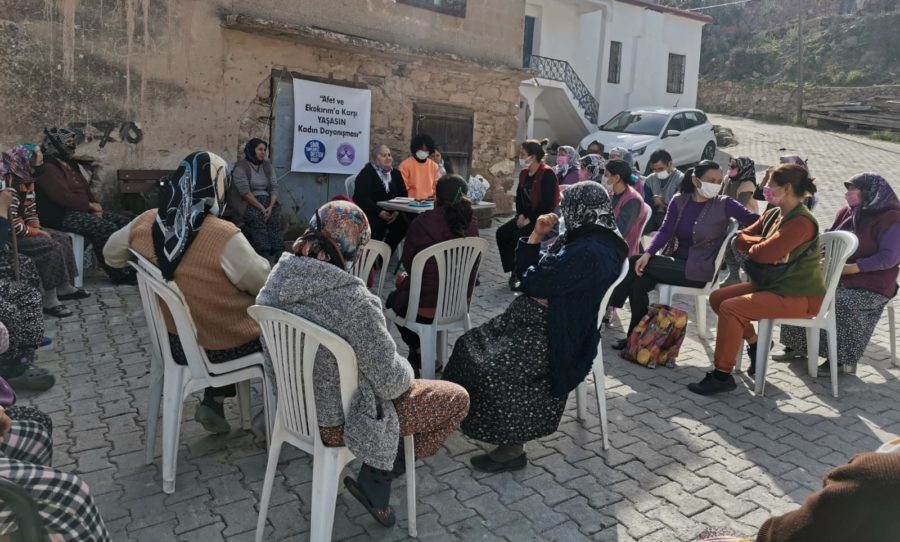
Labour Is Mine Women’s Association (Emek Benim Kadın Derneği) is receiving a grant from our Turkey Wildfire Relief and Mitigation Fund to support women who were affected by the wildfires, ensuring their access to financial and in-kind support provided by public institutions and civil society organisations (CSOs). The association will also provide women with seeds, clothing, and hygiene products.
Read the interview below:
Labour Is Mine Women’s Association received a grant for the first time from our foundation. Can you tell us about the aim and activities of your organisation?
While our association was carrying out fieldwork to make home-based workers more visible, we saw that women work very hard both to earn a living and to take care of their homes. With the collaboration of 35 women, we established our association in 2013. We are a rights-based organisation and work mainly on labour issues, and we also prioritise issues such as women’s rights, gender equality awareness, violence against women, and child abuse. We recently organised a 2-day Feminist Solidarity in Combating Women’s Poverty workshop with 17 women’s organisations. In this workshop, we discussed the potential solidarity practices we could develop with different women’s associations and cooperatives. Additionally, we conducted a survey with 127 participants with the support of the Etkiniz EU Program during the pandemic, when the roles imposed on women got even heavier.
Home-based working women are not recognised and they have too many responsibilities within the home.
You make the problems of home-based working women visible. What kind of problems do home-based workers face? What can public institutions and CSOs do to tackle these problems?
Home-based working women are not recognised and they have too many responsibilities within the home. They are forced to work in poor and unhealthy conditions, often without social security. They have difficulty accessing opportunities to sell their products. For this reason, public institutions and organisations, predominantly the Social Security Institution in Turkey, should regulate the laws so that home-based women can retire and benefit from social rights. For example, we think that women who produce at home should be exempt from tax. Local governments should support women and provide areas to sell their products. In addition, the childcare burden of home-based working women should be eased.
During the wildfires in the summer of 2021, we frequently encountered news about women’s struggles. On the other hand, many women had to leave their places of residence. How did the wildfires affect women?
Women’s migration from their homes, vineyards, memories, and places where they had lived for years caused them to become depressed. Even though they had to go, their minds were always left behind. Migrating and rebuilding life in a new place is hard for every woman. Especially if they are not adequately supported, their burden becomes even greater.
We find it important for women to understand that we work with a rights-based approach, instead of an aid-oriented one.
Strengthening solidarity among women is at the heart of your work. Can you tell us about your methods in this context?
First of all, we try to build a trust-based, equal relationship with the women. We find it important for women to understand that we work with a rights-based approach, instead of an aid-oriented one. Another issue that we prioritise is making women perceive our activities not as support offered to them, but as mutual solidarity. This is why we use participatory methods. Finally, we ensure the continuity of communication by developing a more in-depth and close relationship with the people who stand out from the group we come into contact with.
With our grant support, you are implementing the Strengthening Women’s Solidarity Against Disaster and Ecocide project. What is the idea behind this project?
We are implementing this project with the grant provided by the Turkey Mozaik Foundation and the Support Foundation for Civil Society. With this project, we will ensure that women can access support provided by the public institutions and CSOs while resettling in their villages. We will develop a women’s solidarity-oriented communication between the women who lost their family agricultural lands and seeds, with the women who were not affected by the fires. This way, women will be provided with seeds and solidarity practices among women that respect the ecological cycle will develop. By increasing women’s resilience, we will raise awareness of protecting life and gender equality.
Recovery processes should be structured on the basis of gender-sensitive planned public support and social solidarity.
During the wildfires, we visited the women who left the burning villages and towns in Muğla. We quickly provided clothing and other necessary materials for the women. Additionally, we provided information to civil networks such as the Aegean Women’s Gathering and the Disaster Platform by determining needs in the field. Once again, we observed that there was a need for more activities. It is necessary to spread the awareness of prevention and protection before climate crisis based disasters such as wildfires, earthquakes, droughts and floods, and also human-made disasters. Recovery processes should be structured on the basis of gender-sensitive planned public support and social solidarity.
About Labour Is Mine Women’s Association
Labour Is Mine Women’s Association, established in Muğla in 2013, aims to contribute to the economic, social, cultural, legal, political, and individual empowerment of women. To this end, the Association provides legal and psychological support to women who are subjected to violence. The Association also works in the field of women’s employment and brings the problems faced by home-based workers to the agenda and proposes solutions.



